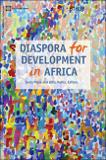
Publications & Research :: Publication
Diaspora for Development in Africa
Attachments [ 2 ]
More Details
The diaspora of developing countries can be a potent force for development for their countries of origin, through remittances, but also, importantly, through promotion of trade, investments, research, innovation, and knowledge and technology transfers. This book brings relevant experience from both developed and developing countries to bear on issues confronting today's governments in linking with their diaspora. The chapters present different approaches used by countries that have tried to maximize the possible gains from migration by engaging more comprehensively with different diaspora groups and individuals. Some African countries are pursuing policies to develop links with Africans abroad, either to encourage them to return or to use their skills, knowledge, or financial capital to foster African development. The book discusses concrete examples of diaspora initiatives that are being implemented in Africa. There are comprehensive reviews on how the diaspora can promote trade and investment linkages. Some developing countries are using dual citizenship to deepen ties with their diaspora. The book directly addresses the issues of remittances-linked financial instruments, investments by the diaspora, diaspora bonds, contributions of skilled and unskilled diaspora in transferring knowledge, analytical research on return migration, and concrete circular migration experiences. There is a need to have a better understanding of these initiatives and to see whether they can be scaled up or replicated in other countries worldwide.
Comments
(Leave your comments here about this item.)